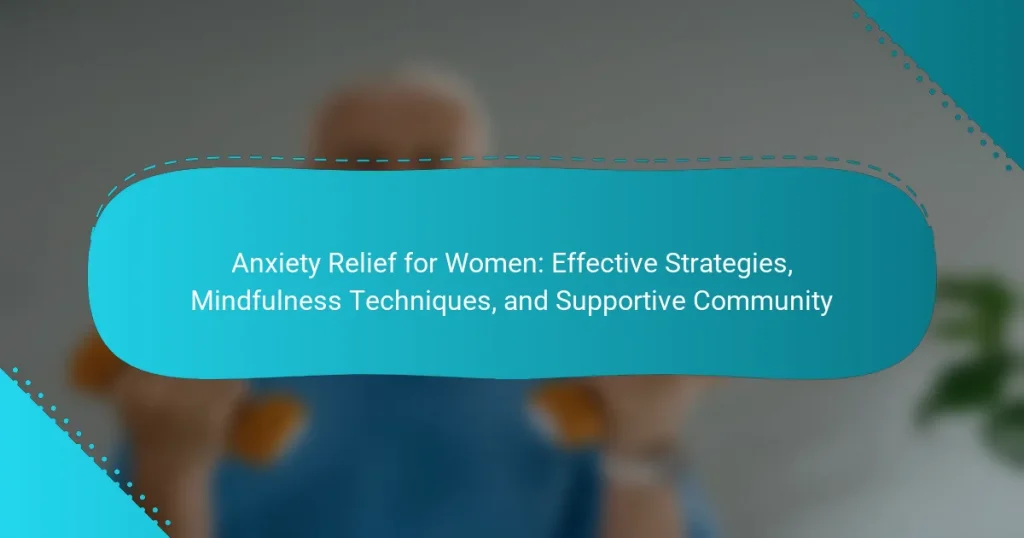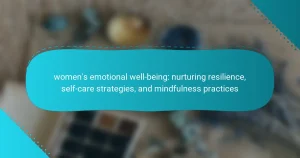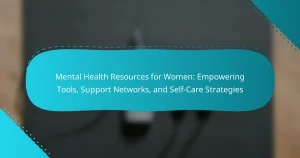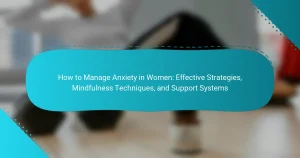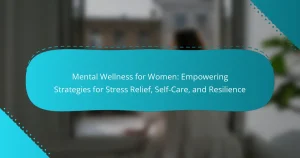Anxiety relief for women involves understanding unique challenges and effective strategies. Explore common causes like hormonal fluctuations and societal pressures. Discover mindfulness techniques such as deep breathing and meditation. Learn about the benefits of supportive communities and lifestyle changes. Consider unique approaches like nature therapy and creative expression to enhance coping strategies.
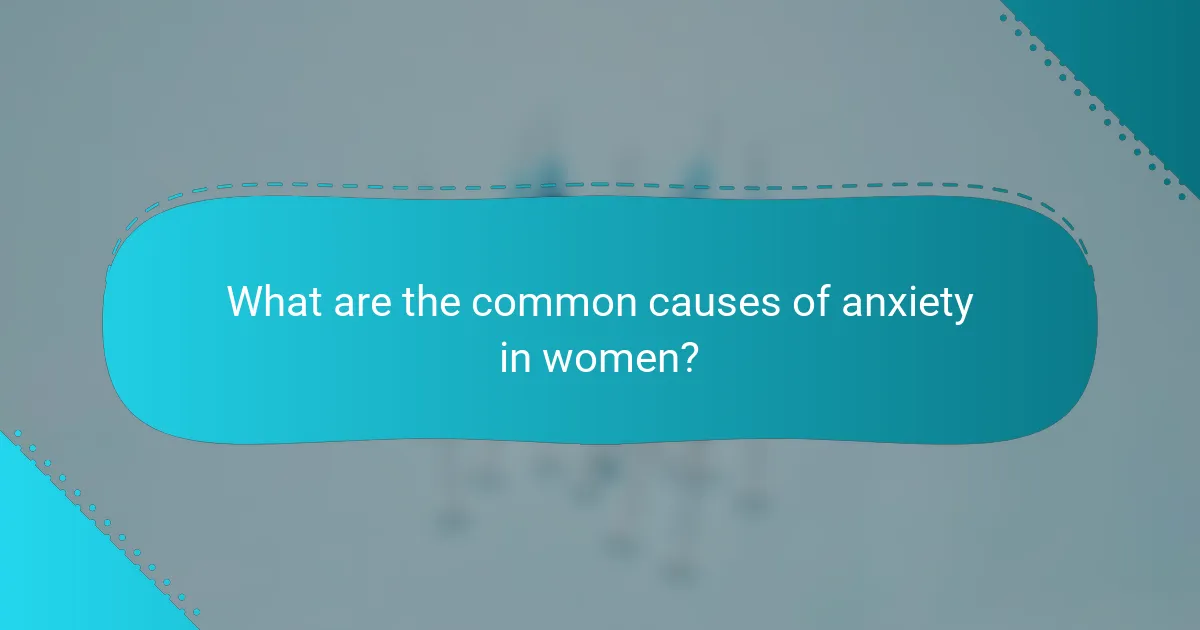
What are the common causes of anxiety in women?
Common causes of anxiety in women include hormonal fluctuations, societal pressures, trauma, and mental health history. Hormonal changes during menstruation, pregnancy, and menopause can significantly impact emotional well-being. Societal expectations around roles and responsibilities often create stress. Trauma, whether recent or past, can trigger anxiety symptoms. Additionally, a family history of anxiety disorders increases susceptibility. Understanding these factors is crucial for effective anxiety relief strategies.
How do hormonal changes impact anxiety levels?
Hormonal changes can significantly elevate anxiety levels in women. Fluctuations in oestrogen and progesterone can affect mood regulation, leading to increased anxiety symptoms. For instance, during menstrual cycles, pregnancy, or menopause, many women report heightened anxiety. Understanding these patterns can aid in developing effective anxiety relief strategies tailored for women, such as mindfulness techniques and community support.
What role do societal pressures play in women’s anxiety?
Societal pressures significantly contribute to women’s anxiety by creating unrealistic standards and expectations. These pressures manifest through media portrayals, career demands, and social roles, leading to feelings of inadequacy. Studies indicate that women are more likely to experience anxiety due to these societal comparisons, impacting their mental health. Effective strategies for anxiety relief include mindfulness techniques and building supportive communities, which can help women navigate these pressures and enhance their well-being.
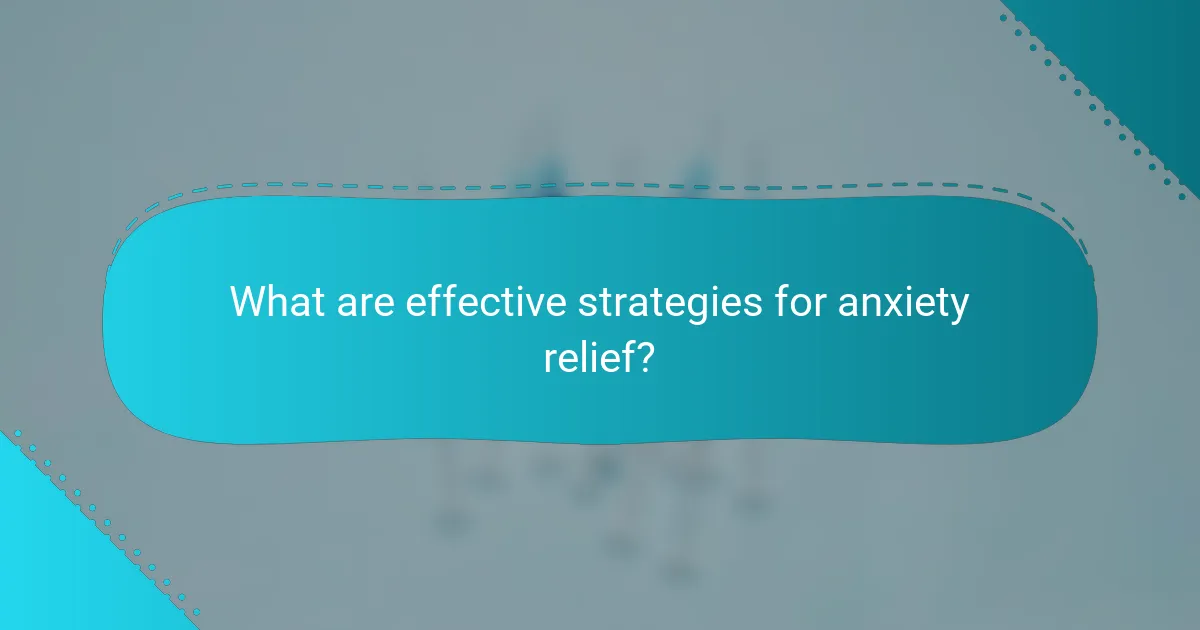
What are effective strategies for anxiety relief?
Effective strategies for anxiety relief include mindfulness techniques, community support, and lifestyle changes. Mindfulness practices such as meditation and deep breathing can significantly reduce anxiety levels. Joining supportive communities provides emotional validation and shared experiences. Regular physical activity and a balanced diet also contribute to improved mental health. Lastly, seeking professional help when needed is crucial for long-term relief.
How can cognitive-behavioral therapy help?
Cognitive-behavioral therapy (CBT) effectively helps women manage anxiety by providing practical strategies. CBT teaches techniques to challenge negative thoughts, develop coping skills, and engage in mindfulness practices. Research shows that women who undergo CBT report significant reductions in anxiety symptoms, enhancing their overall well-being. This structured approach fosters a supportive community, encouraging shared experiences and collective healing.
What are the benefits of physical activity in reducing anxiety?
Physical activity significantly reduces anxiety by promoting the release of endorphins and improving mood. Regular exercise enhances self-esteem, provides a distraction from worries, and fosters social interaction, all contributing to anxiety relief. Studies show that even moderate activity, such as walking, can lead to noticeable improvements in mental health. Additionally, engaging in physical activity can create a sense of routine, which is beneficial for managing anxiety symptoms.
Which exercises are most effective for anxiety relief?
Regular physical activity is one of the most effective strategies for anxiety relief. Exercises such as yoga, walking, and strength training can significantly reduce anxiety symptoms. Yoga combines physical movement with mindfulness, promoting relaxation and stress reduction. Walking provides a simple way to increase endorphins, enhancing mood. Strength training has been shown to improve self-esteem and reduce anxiety levels. Engaging in these activities consistently can foster a supportive community and improve overall mental health.
How does nutrition influence anxiety levels?
Nutrition significantly influences anxiety levels through its impact on brain chemistry and overall well-being. A balanced diet rich in omega-3 fatty acids, whole grains, and antioxidants can reduce anxiety symptoms. For example, studies show that deficiencies in certain nutrients, like magnesium and vitamin D, correlate with increased anxiety. Additionally, maintaining stable blood sugar levels through regular meals can help manage mood and anxiety. Consuming probiotics may also enhance gut health, which is linked to mental health. Fostering a supportive community around nutrition can further improve emotional resilience.
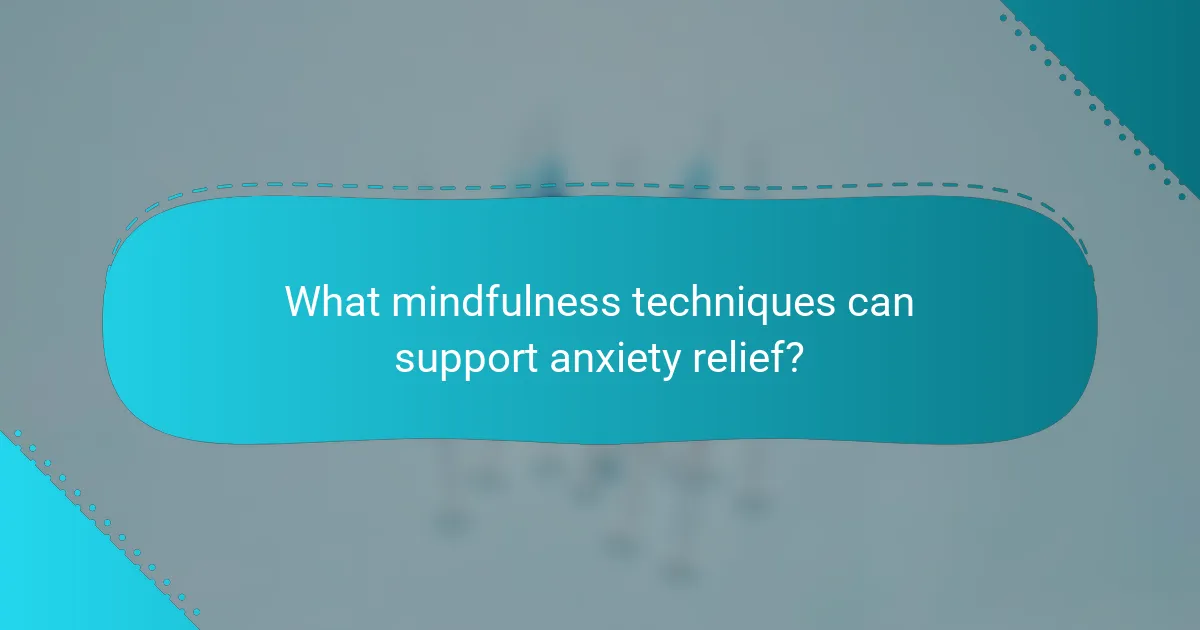
What mindfulness techniques can support anxiety relief?
Mindfulness techniques such as deep breathing, body scanning, and meditation can effectively support anxiety relief for women. These practices promote relaxation and self-awareness, helping to manage anxiety symptoms. Deep breathing exercises focus on slow, controlled breaths to reduce stress. Body scanning involves paying attention to physical sensations, promoting a connection between mind and body. Meditation enhances focus and clarity, offering a mental break from anxious thoughts. Engaging with a supportive community can further strengthen these techniques, providing encouragement and shared experiences.
How can meditation be used to manage anxiety?
Meditation can effectively manage anxiety by promoting relaxation and mindfulness. Regular practice helps reduce stress hormones and enhances emotional regulation. Mindfulness techniques, such as focused breathing and body scans, cultivate awareness, allowing women to observe anxious thoughts without judgment. As a result, meditation creates a supportive community that fosters shared experiences and coping strategies.
What are beginner-friendly meditation practices?
Beginner-friendly meditation practices include mindfulness meditation, guided imagery, and body scan techniques. These practices help reduce anxiety and promote relaxation. Mindfulness meditation involves focusing on the present moment, while guided imagery uses visualization to create calming mental images. Body scan techniques encourage awareness of physical sensations, fostering a deeper connection with oneself. Each method can be easily integrated into daily routines, making them accessible for beginners seeking anxiety relief.
What role does deep breathing play in anxiety management?
Deep breathing significantly aids in anxiety management by promoting relaxation and reducing stress levels. This technique activates the body’s relaxation response, helping to lower heart rate and blood pressure. Research shows that deep breathing exercises can decrease anxiety symptoms and improve overall mental clarity. Practicing deep breathing regularly enhances emotional regulation and fosters mindfulness, making it a unique and effective strategy for women seeking anxiety relief.
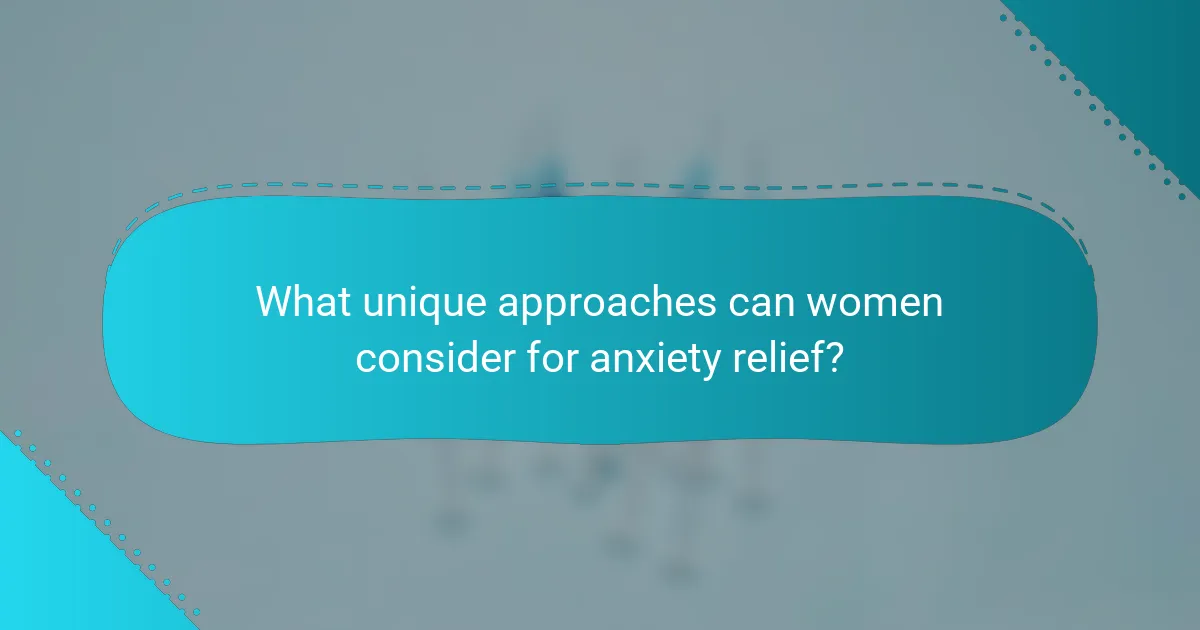
What unique approaches can women consider for anxiety relief?
Women can consider unique approaches for anxiety relief such as nature therapy, creative expression, and community support. Nature therapy involves spending time outdoors, which has been shown to reduce anxiety levels significantly. Creative expression, through art or writing, allows for emotional release and self-discovery, fostering resilience. Additionally, building a supportive community can provide essential connections and shared experiences, enhancing coping strategies. Each of these approaches offers distinct benefits tailored to women’s experiences with anxiety.
How does art therapy contribute to emotional well-being?
Art therapy significantly enhances emotional well-being by providing a creative outlet for self-expression. It helps women manage anxiety through mindfulness techniques that promote relaxation and self-awareness. Engaging in artistic activities fosters a sense of community, offering support and understanding among participants. Studies show that art therapy can reduce symptoms of anxiety, with 75% of women reporting improved emotional health after sessions. This unique approach integrates psychological support with creative expression, making it an effective strategy for emotional relief.
What is the impact of journaling on anxiety reduction?
Journaling significantly reduces anxiety by providing a safe space for expression and reflection. It helps women process emotions, identify triggers, and develop coping strategies. Research shows that regular journaling can lower stress levels and improve mental clarity. A study indicated that expressive writing can lead to a 20% reduction in anxiety symptoms. By fostering mindfulness, journaling promotes self-awareness and emotional regulation, contributing to overall mental well-being.
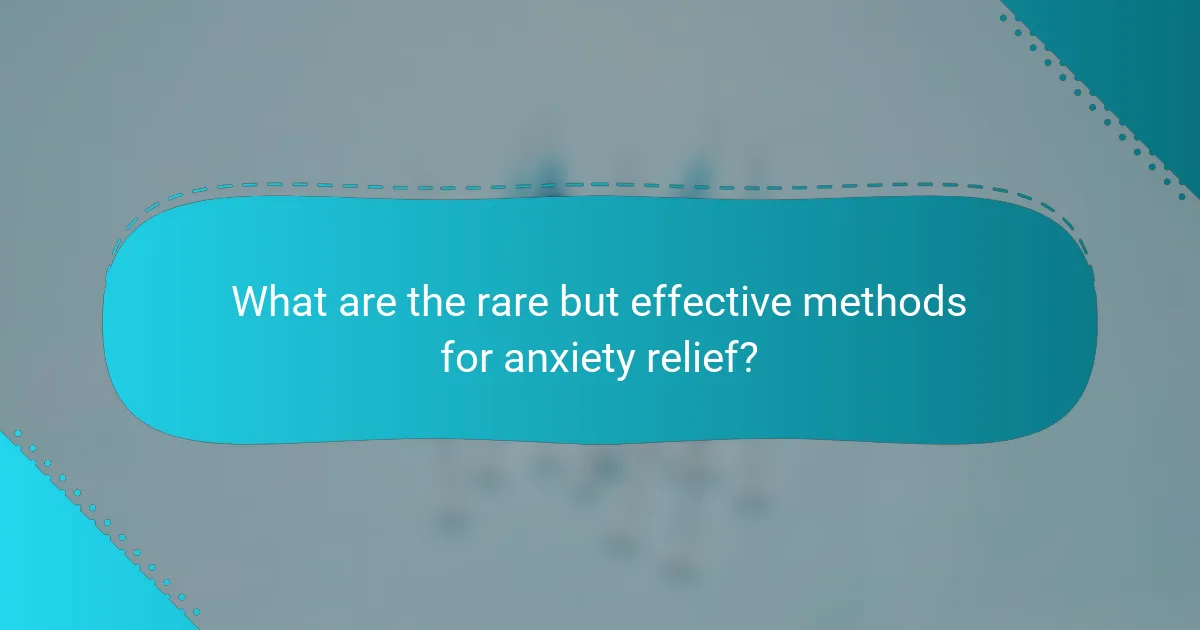
What are the rare but effective methods for anxiety relief?
Breathing techniques and nature immersion are rare but effective methods for anxiety relief. Deep breathing exercises, such as the 4-7-8 technique, can significantly reduce anxiety levels. Nature immersion, involving time spent in natural environments, has been shown to lower stress hormones and improve mood. Engaging in artistic expression, like painting or writing, can also provide unique emotional release. Additionally, practicing gratitude through journaling fosters a positive mindset, contributing to overall anxiety reduction.
How can nature therapy benefit mental health?
Engaging in nature therapy can significantly alleviate anxiety in women. Exposure to natural environments reduces stress and promotes emotional well-being. Research indicates that spending time outdoors enhances mood and fosters mindfulness. Nature therapy also encourages community support, which is vital for mental health. Incorporating strategies like guided walks or mindfulness exercises in nature can deepen these benefits.
What is the role of community support in managing anxiety?
Community support plays a crucial role in managing anxiety by providing emotional validation and shared experiences. Engaging with supportive groups can reduce feelings of isolation, fostering resilience among women facing anxiety. Research indicates that social connections can enhance coping strategies, leading to improved mental health outcomes. Supportive environments often promote mindfulness techniques, which are effective in anxiety relief.
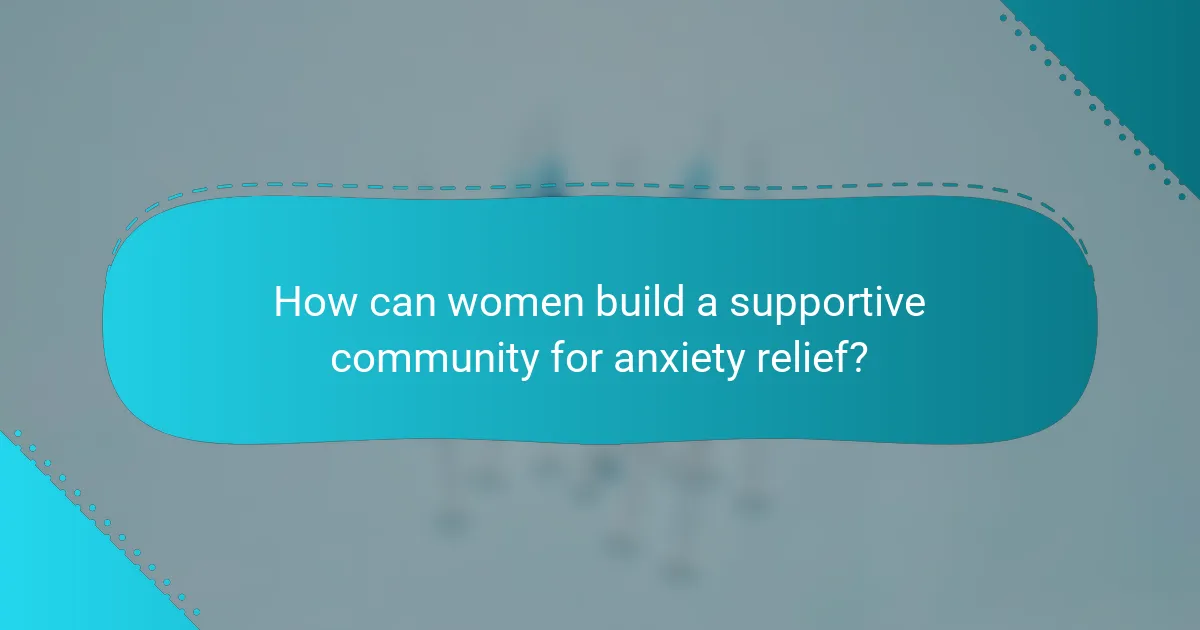
How can women build a supportive community for anxiety relief?
Women can build a supportive community for anxiety relief by fostering open communication and shared experiences. Engaging in group activities, such as mindfulness sessions or support groups, enhances connection and understanding. Collaborative platforms, both online and offline, allow for sharing coping strategies and emotional support. Regular check-ins among members can create a safe space for discussing challenges and successes, reinforcing the community bond. Prioritizing inclusivity and empathy within the group strengthens resilience against anxiety.
What are the benefits of support groups for women?
Support groups for women provide emotional support, reduce feelings of isolation, and enhance coping strategies. These groups foster a sense of community, allowing women to share experiences and gain new perspectives. Research shows that participation can lead to decreased anxiety levels and improved mental health outcomes. Engaging in these supportive environments can also promote resilience, encouraging women to navigate challenges more effectively.
How can online platforms provide emotional support?
Online platforms can provide emotional support by fostering community connections, offering resources, and facilitating mindfulness practices. These platforms create safe spaces for women to share experiences and access anxiety relief strategies. Supportive communities empower women through shared stories and advice, enhancing feelings of belonging. Interactive features, such as chat rooms and forums, allow for real-time support, making emotional assistance readily available. Mindfulness techniques, such as guided meditations and relaxation exercises, are often integrated, helping users manage anxiety effectively.
What are the best practices for fostering connections?
To foster connections, prioritize open communication and shared experiences. Engage in group activities that promote teamwork and understanding. Utilize mindfulness techniques to enhance emotional awareness, which can strengthen relationships. Create a supportive community by encouraging vulnerability and active listening among participants.
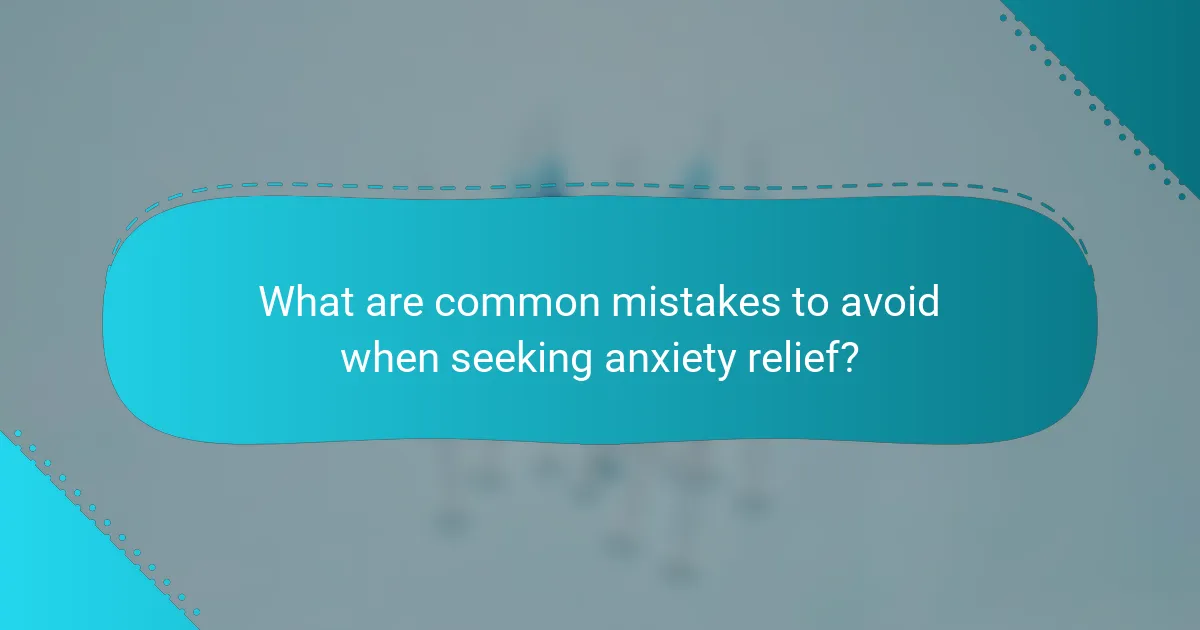
What are common mistakes to avoid when seeking anxiety relief?
Common mistakes when seeking anxiety relief include relying solely on medication, neglecting self-care, and avoiding professional help. Many women overlook the importance of holistic approaches. For example, mindfulness techniques and community support are often undervalued. As a result, they may miss effective strategies that enhance overall well-being. Prioritizing a balanced approach that includes both mental and emotional support is crucial for sustainable anxiety relief.
How can unrealistic expectations hinder progress?
Unrealistic expectations can significantly hinder progress in anxiety relief for women. They create pressure that can lead to increased anxiety, discouragement, and feelings of inadequacy. Setting achievable goals fosters a supportive community and encourages the use of effective strategies and mindfulness techniques. As a result, realistic expectations can enhance motivation and promote a healthier mindset.
What should women know about self-care in anxiety management?
Self-care is essential for women managing anxiety. Effective strategies include regular exercise, mindfulness practices, and connecting with supportive communities. Exercise releases endorphins, reducing anxiety symptoms. Mindfulness techniques, such as meditation and deep breathing, enhance emotional regulation. Joining support groups fosters connection and shared experiences, providing valuable resources. Prioritizing self-care can significantly improve mental well-being for women facing anxiety.
What expert insights can guide effective anxiety relief strategies?
Effective anxiety relief strategies for women include mindfulness techniques, community support, and expert insights. Mindfulness practices such as meditation and deep breathing reduce anxiety symptoms. Engaging with a supportive community fosters connection and shared experiences, enhancing emotional resilience. Experts recommend regular physical activity and healthy nutrition as foundational elements for managing anxiety. Additionally, cognitive-behavioral therapy (CBT) offers structured approaches to challenge negative thought patterns. Prioritizing self-care and establishing a routine can significantly improve overall mental health.
